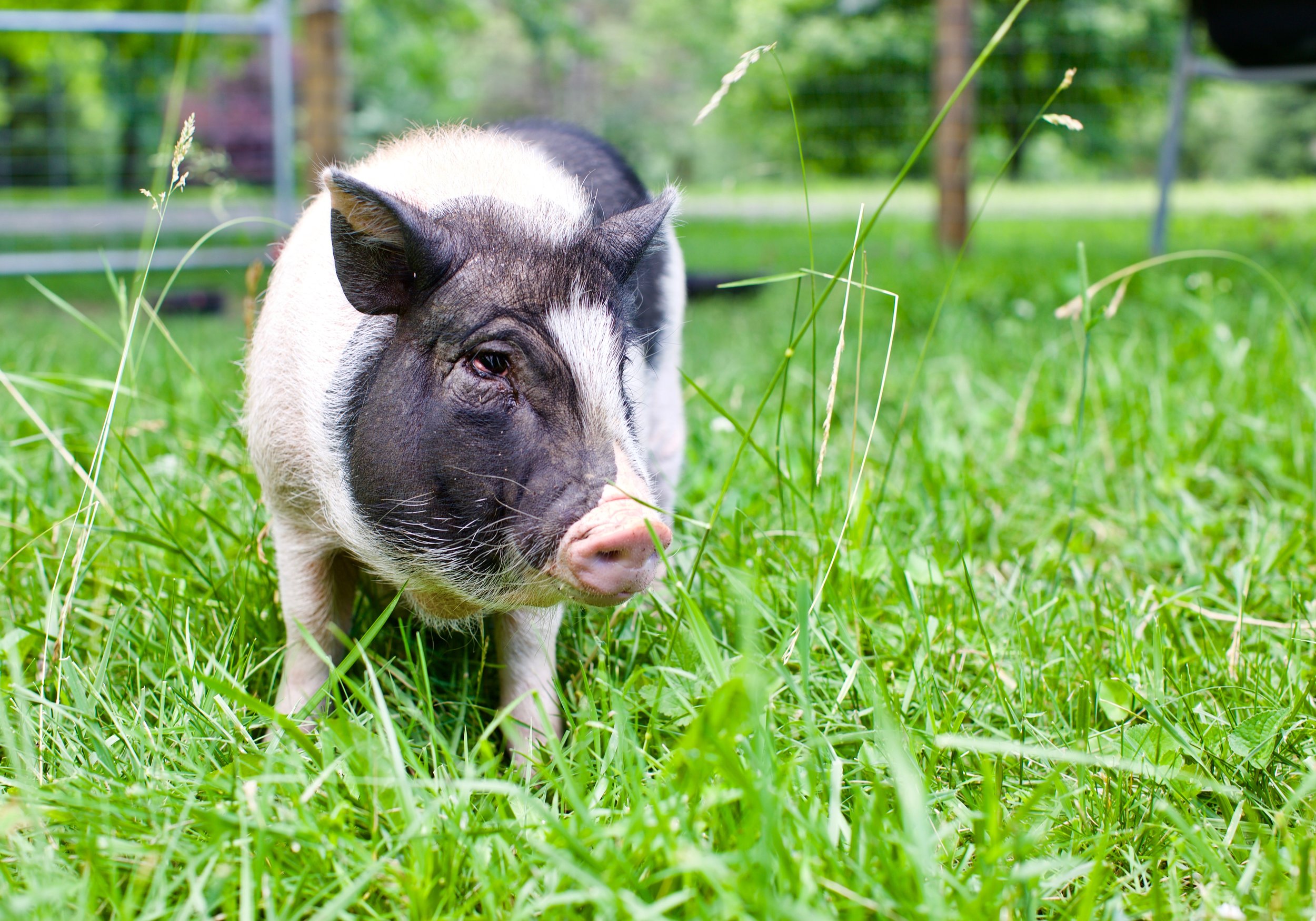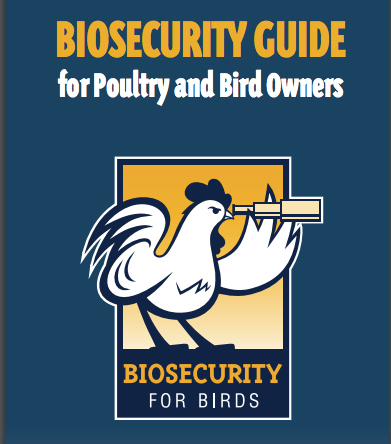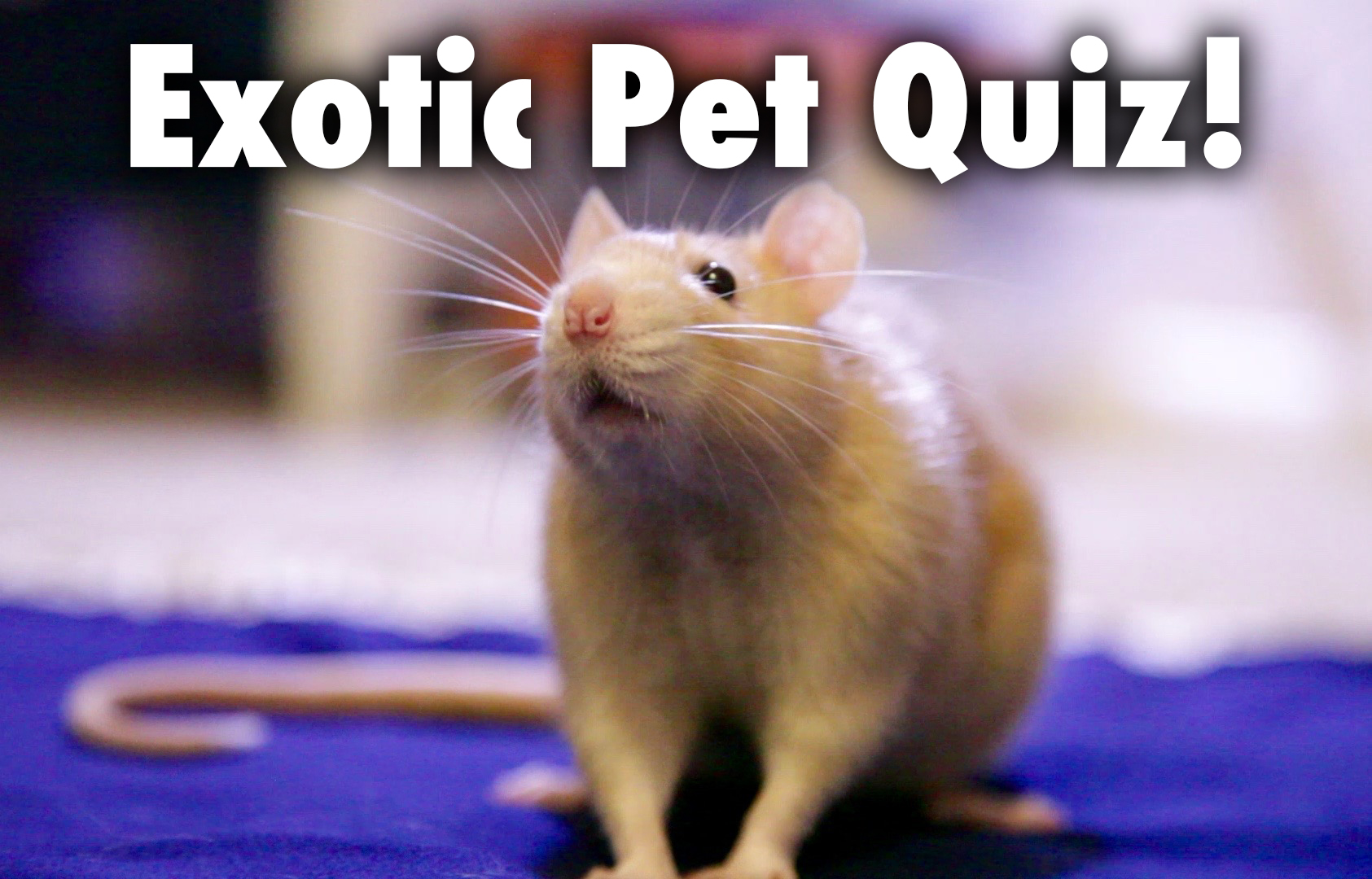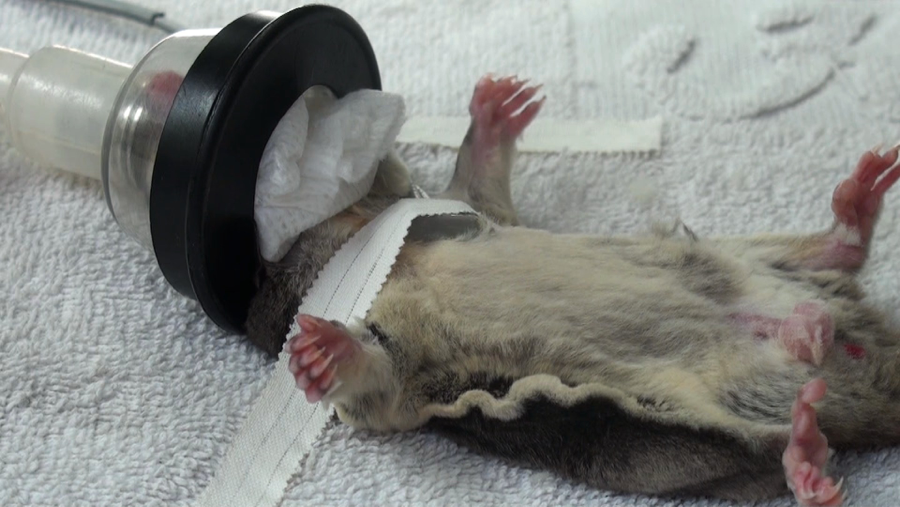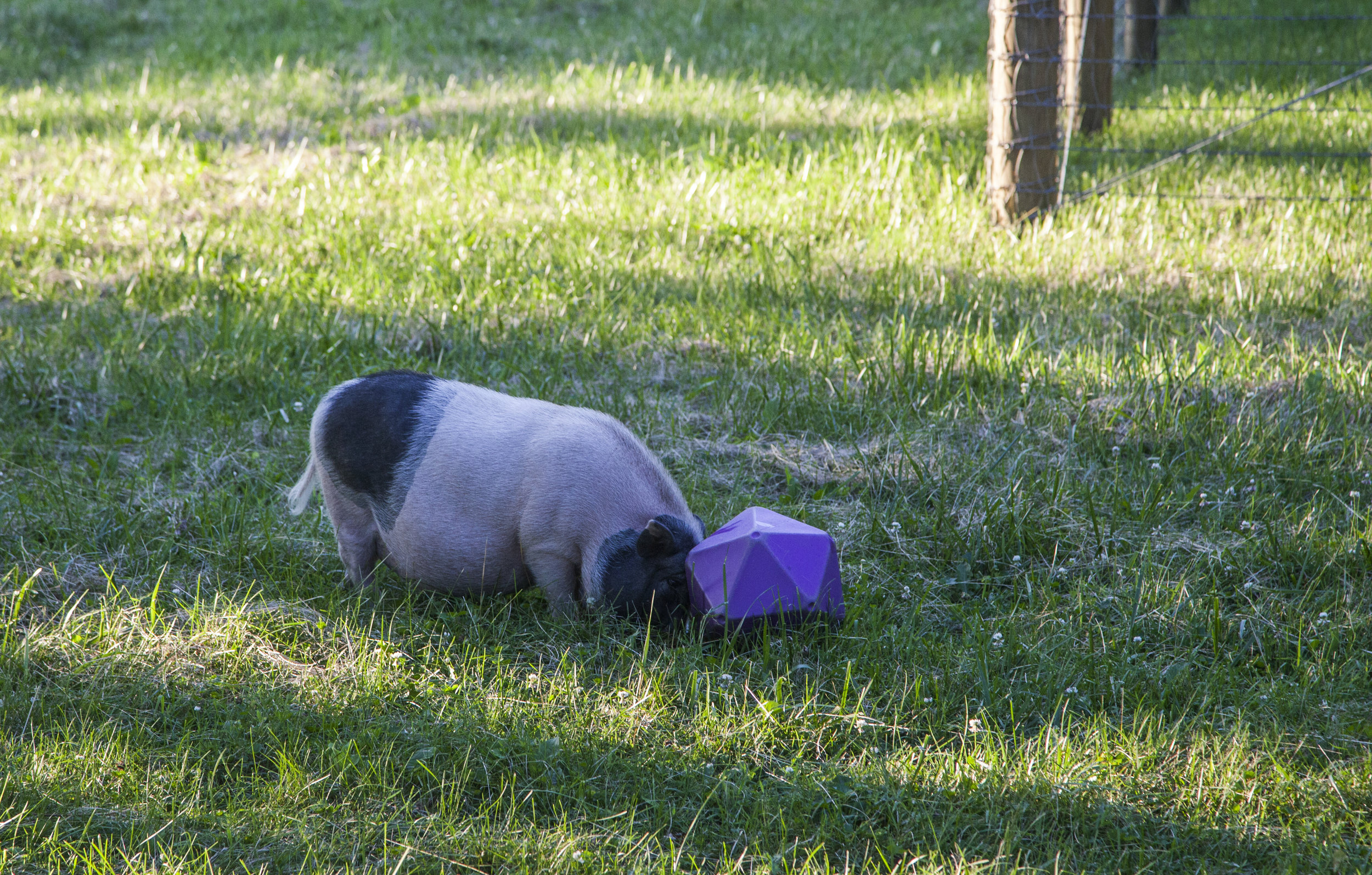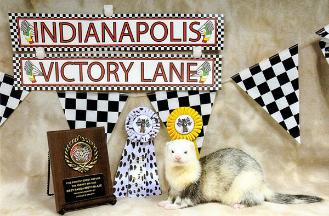Our Good Samaritan Focus: The Amazing Trash Rescue
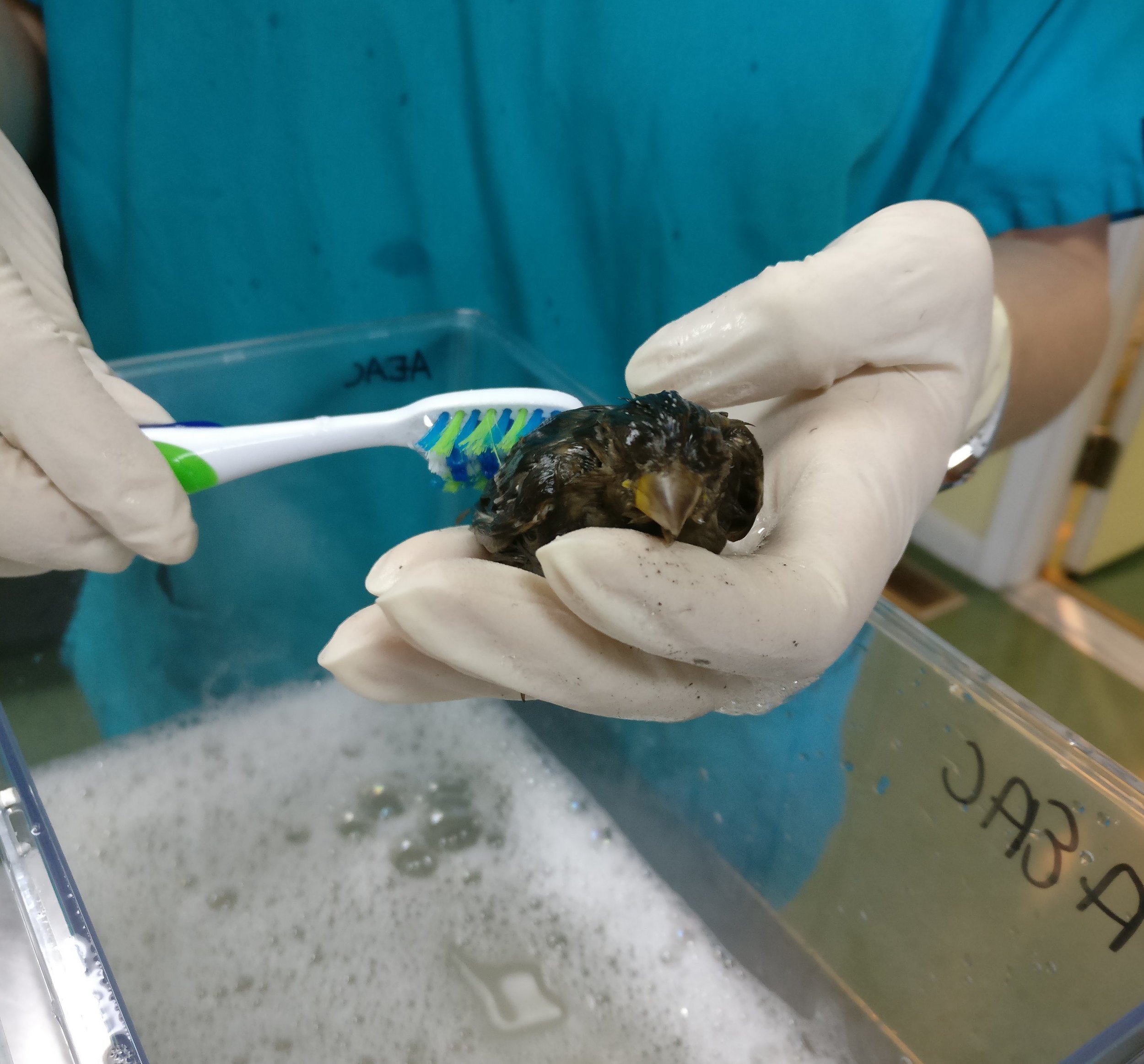 The staff was surprised to see a commercial trash truck pull into the parking lot across the street from the clinic, and the driver rush in carrying a box of birds. The driver had found the wild birds trapped in sticky goo, and left in a box along with the trash to throw away. The driver risked his job to take the truck off the route to get the birds help!
Cleaning them up was no easy task! Each bird was sedated, cleansed, rinsed and dried. The whole process took the better part of an hour and the the birds rested quietly overnight in a warm incubator while they dried. The next day, our amazing bird rehabbers Liz and Chris Hatton came and picked them up. They report that these little guys have made a full recovery, were released, and still visit their feeders occasionally!
The staff was surprised to see a commercial trash truck pull into the parking lot across the street from the clinic, and the driver rush in carrying a box of birds. The driver had found the wild birds trapped in sticky goo, and left in a box along with the trash to throw away. The driver risked his job to take the truck off the route to get the birds help!
Cleaning them up was no easy task! Each bird was sedated, cleansed, rinsed and dried. The whole process took the better part of an hour and the the birds rested quietly overnight in a warm incubator while they dried. The next day, our amazing bird rehabbers Liz and Chris Hatton came and picked them up. They report that these little guys have made a full recovery, were released, and still visit their feeders occasionally!
The Truth about "Micro Teacup" Mini Pigs
Mini pigs make great pets, no doubt about that! For those wishing to add a pet pig to the household (or barnyard), remember it’s buyer beware! ALL baby pigs are small! Some unscrupulous breeders sell baby pigs far younger than recommended so they look small, but hide the fact they will be much larger than grown. Remember that a miniature pig is not full grown until 5 years of age and a healthy adult miniature pig should weigh between 40-120 lbs, depending on the breed. If the breeder says that your pig will be smaller than that, they are either misleading you or selling an unhealthy pig. How can you be sure your mini pig stays mini?
- Check the references of the breeder, and ask to talk with other buyers and possibly visit their pigs. Avoid breeders who won’t get put you in contact with other buyers.
- Ask to see the parents. Of course, you could always be shown other pigs who are not the parents, but if the breeder hesitates or declines, walk away. Again, remember that pigs are not fully grown until 5 years of age and can be bred well before that, so the parents may not be fully grown yet either!
- Never buy a bottle fed or pre-weaned pig; these animals are at higher risk for medical and behavioral problems. Only buy pigs that are completely weaned and eating solid food well.
- NEVER buy the runt; this actually goes for any species! (This doesn’t mean we don’t love rescuing them!)
- Only buy pets from breeders with a health guarantee, and bring your new pig for a health check up as soon as possible after purchase. If your pig has not been spayed or neutered before purchase, it is very important to arrange the surgery while they are still relatively small, as surgery is generally cheaper and recovery is faster when pigs are still small. We recommend spaying all pet pigs for medical and behavioral reasons.
Remember pot belly pigs should eat commercial food designed for pet pigs, never for farm pigs. Avoid obesity and all the secondary health problems by never feeding your pig from the table, and only offering healthy vegetables and some fruits for treats. Free range pigs allowed to graze and get exercise are almost always the healthiest!
Pigs are very smart and can develop behavior problems if not properly trained and enriched. While many owners find this to be the best part of owning a pig, it can be a lot of work and isn't for everyone. We offer free pre-purchase consults for all new pet-owners and we strongly recommend that you come meet with us BEFORE you purchase your pig to make sure that you are prepared to provide everything she needs to live a long and happy life!
Parrot Wings: to trim or not to trim?
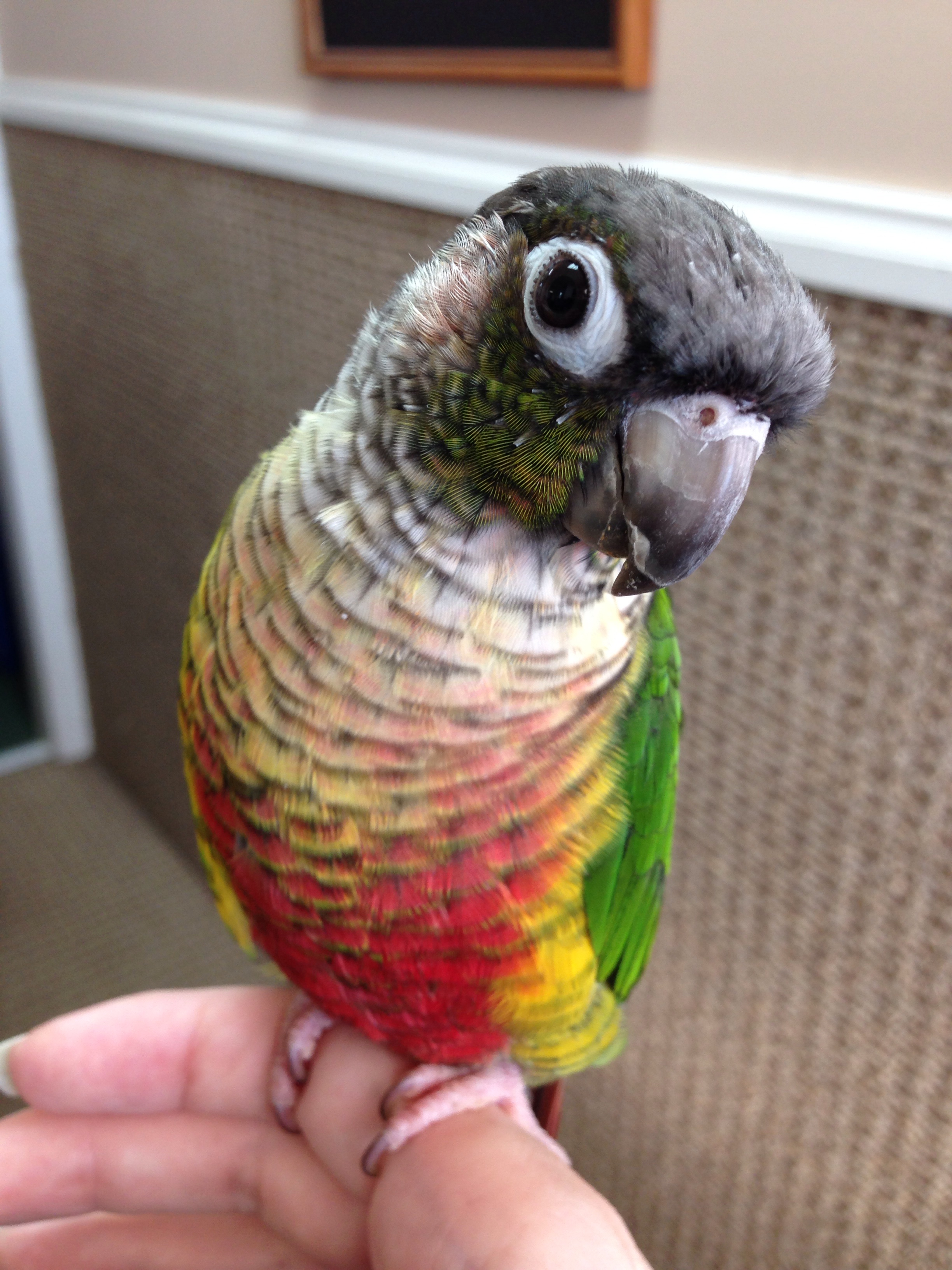 Since the arrival of the beautiful Natural Encounters macaws at the Indianapolis Zoo, we’ve had some inquiries on whether or not our pet birds should be given the opportunity to fly.
Firstly, flying free like the zoo bird is not safe for pet birds, and requires skilled trainers and many, many hours of flight training. We do not recommend allowing your pet to free fly outdoors at all.
Since the arrival of the beautiful Natural Encounters macaws at the Indianapolis Zoo, we’ve had some inquiries on whether or not our pet birds should be given the opportunity to fly.
Firstly, flying free like the zoo bird is not safe for pet birds, and requires skilled trainers and many, many hours of flight training. We do not recommend allowing your pet to free fly outdoors at all.
However, many of our pets can benefit from limited free flight in a safe indoor environment, like a special large flight cage, or a room devoted to flight. The flight area must be safe and free of moving obstacles, sources of toxins and large windows that might look like a place to fly if the bird gets spooked.
It’s also important to remember that not all birds are good fliers. Some did not get the opportunity to learn while young, and may be fearful at the prospect. Some can be gradually taught, but some are never comfortable.
And of course, birds whose wings are not trimmed are always a ‘flight risk” should they accidentally escape outdoors, so special vigilance is required.
If there is not a safe place for your bird to fly, the bird is safer with a wing trim.
Want to find out more about safe limited flight for pet birds, and whether a wing trim is the best choice for your bird? Give us a call. Another excellent resource is here:http://www.goodbirdinc.com/
Run Away Exotics!
We had a recent call asking if anyone had found a lost adult sulcata tortoise. (These tortoises can grow very large and strong and are good at escaping from outdoor enclosures.) Last week we saw a young ferret for a check up after he escaped outdoors for several days. Every year we get calls from people who find lost parrots. Besides being very careful about maintaining a secure enclosure, what else can exotic pet owners do? Many can’t “wear” ID like a tag on a dog collar. However, nearly very exotic pet can get a microchip (yes, reptiles and birds too!).
We scan every lost pet that good Samaritans bring in for check ups, or who are brought in by one of our partner rescues. If there’s a chip, we have a place to start to reunite the lost pet with the owner.
Thinking about a microchip for your exotic pet? Give us a call and we will go over the entire process.
Hey Pet Poultry Owners: Are you practicing good Biosecurity?
It can make all the difference in keeping your bird healthy! One of the most common scenarios we see at the clinic is disease in a flock that occurs a short time after adding new birds; in every case, good Biosecurity principles were not followed. Do you know how to quarantine your birds? (It’s may be trickier than you think). Do you know how long you should quarantine a new bird? How about how long to quarantine after a bird comes back from a bird show?
Find out everything you need to know in this terrific downloadable guide here.
Hidden Dangers from Pet Chickens?
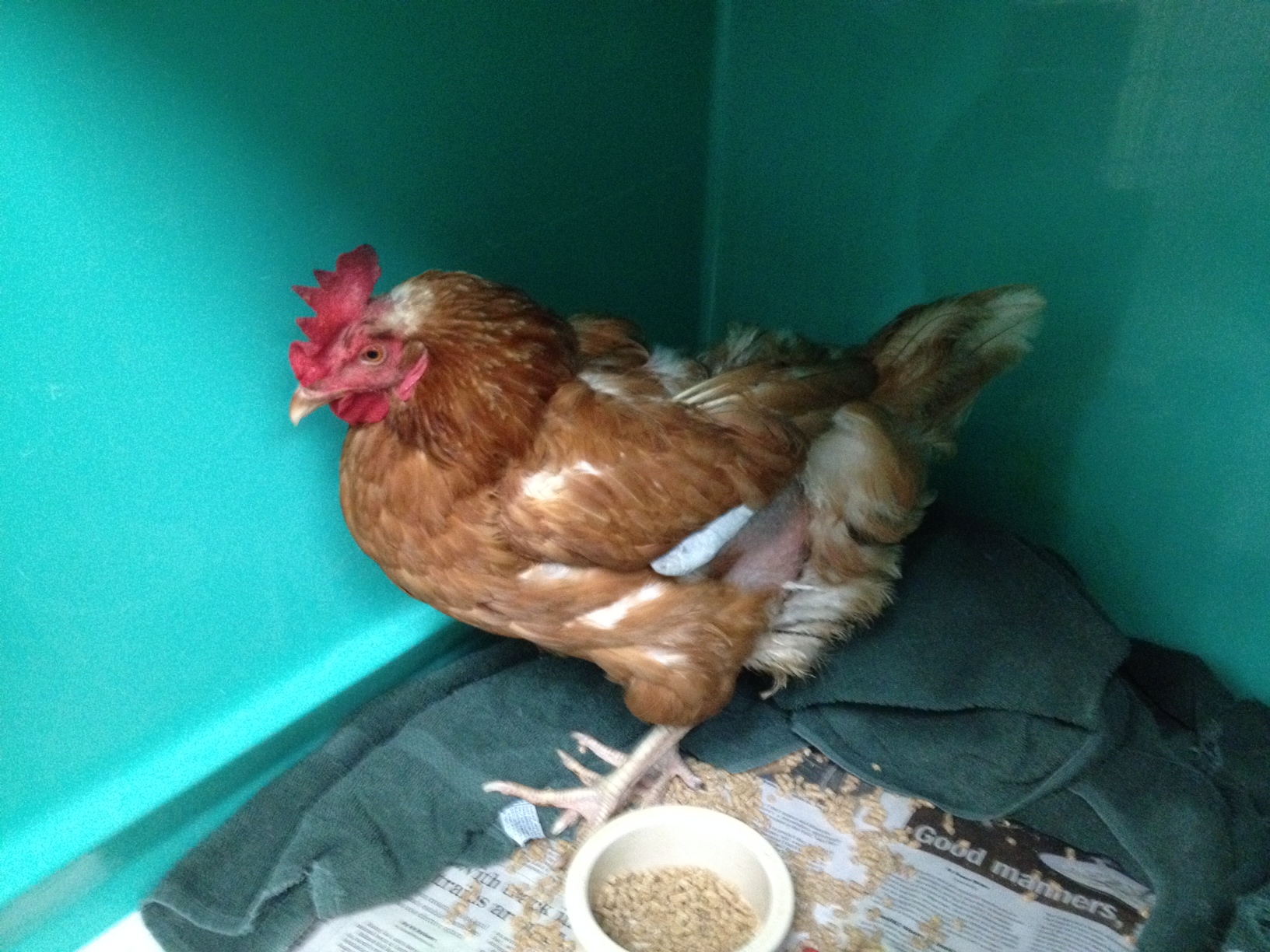 Pet chickens are hugely popular in the Indianapolis area and elsewhere. It’s hard to resist a fluffy chick. However, the Centers for Disease Control (CDC) is seeing an unusual increase in the number of people (including children) who are becoming sick from bacteria acquired from handling pet poultry, especially chicks and ducklings.
Check out the CDC's data here.
Pet chickens are hugely popular in the Indianapolis area and elsewhere. It’s hard to resist a fluffy chick. However, the Centers for Disease Control (CDC) is seeing an unusual increase in the number of people (including children) who are becoming sick from bacteria acquired from handling pet poultry, especially chicks and ducklings.
Check out the CDC's data here.
People with impaired immune systems should probably not handle pet poultry at all. For the rest, carefully wash hands after touching, and keep a bottle of hand sanitizer near the enclosure if soap and water are not nearby. Be sure to monitor children carefully and be sure that wash and don’t eat food while handling pet poultry.
If you have any questions about pet poultry, and how to them healthy, give us a call or email.
And whatever you do, even though it’s hard, try to resist kissing your chickens!
Did you know we see pet goats?
 Goats are great pets. Many of our clients with a few acres are getting a pet goat or two, just for fun (or maybe for “goat yoga”)! Goats are easy to keep, but a few simple precautions can help keep them healthy.
If you are thinking about a pet goat, give us a call, and we’d be happy to discuss diet, vaccines and routine deworming. We also are available in case of injury or illness as well.
Goats are great pets. Many of our clients with a few acres are getting a pet goat or two, just for fun (or maybe for “goat yoga”)! Goats are easy to keep, but a few simple precautions can help keep them healthy.
If you are thinking about a pet goat, give us a call, and we’d be happy to discuss diet, vaccines and routine deworming. We also are available in case of injury or illness as well.
.
Winged Encounters at the Indianapolis Zoo
 Hey Bird Lovers! Looking for something fun to do before the weather changes? We highly recommend Winged Encounters at the Indianapolis Zoo! This is an amazing chance to see beautiful macaws in full flight, and to watch professional trainers at work. The Indy birds are a group that include blue and gold, blue throated, green wing, Hyacinth macaws and more! The birds grew up together and started learning at a very young age.
The flight you will see is a result of a series of small “baby steps” that are rewarded at every phase. No bird is ever forced to perform, and birds receive only positive reinforcement. One important concept is that to build trust, if a bird does not want to fly that day, or prefers not to step up to a trainer, he or she does not have to. We learned a lot of tips that owners can apply to help relationships with their own pet birds.
Hey Bird Lovers! Looking for something fun to do before the weather changes? We highly recommend Winged Encounters at the Indianapolis Zoo! This is an amazing chance to see beautiful macaws in full flight, and to watch professional trainers at work. The Indy birds are a group that include blue and gold, blue throated, green wing, Hyacinth macaws and more! The birds grew up together and started learning at a very young age.
The flight you will see is a result of a series of small “baby steps” that are rewarded at every phase. No bird is ever forced to perform, and birds receive only positive reinforcement. One important concept is that to build trust, if a bird does not want to fly that day, or prefers not to step up to a trainer, he or she does not have to. We learned a lot of tips that owners can apply to help relationships with their own pet birds.
The zoo birds fly until fall….when you see them, tell them their fans at Avian and Exotic said hello!
Introducing Dr. Taylor Lewis!
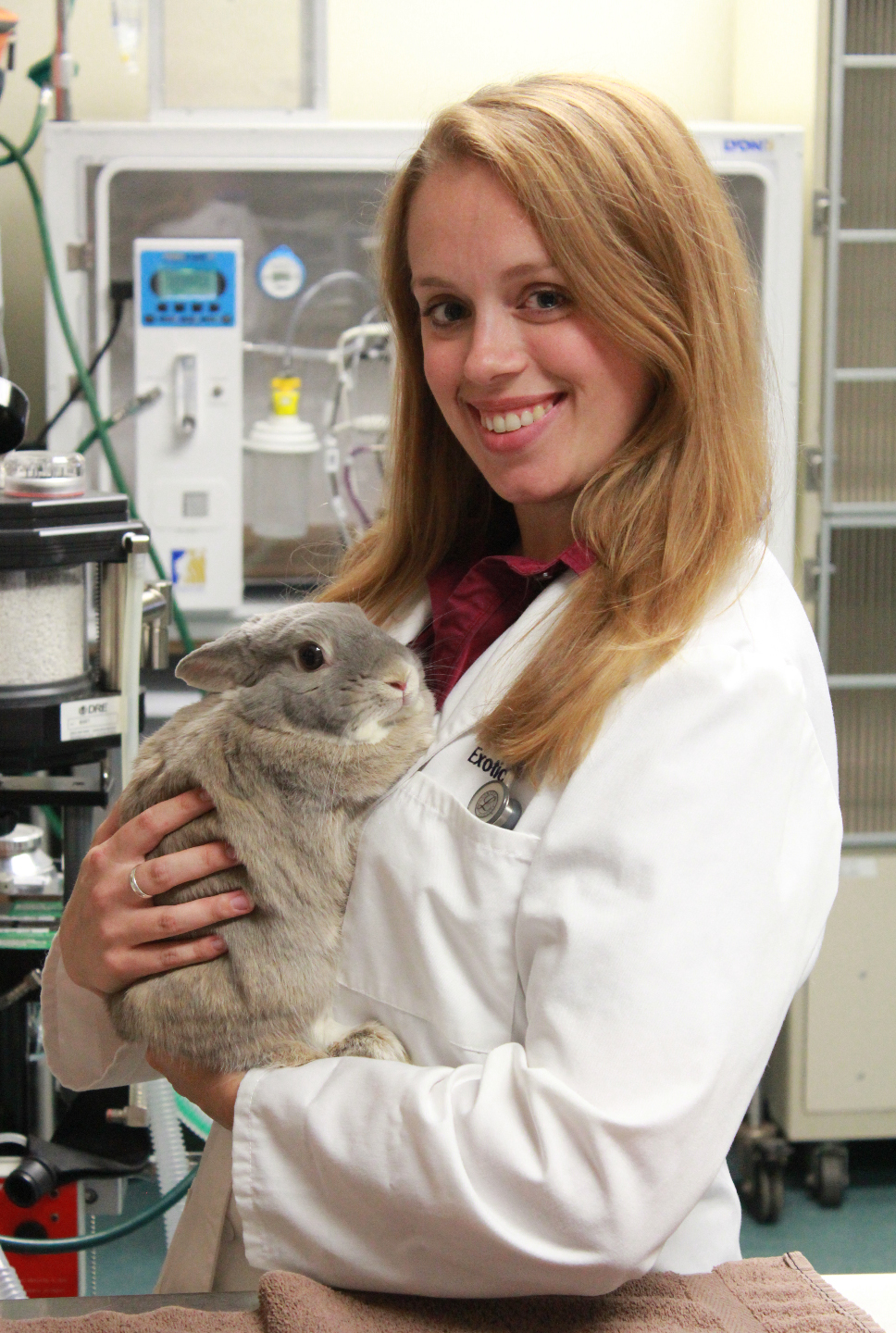 Avian and Exotic Animal Clinic is pleased to introduce Dr. Taylor Lewis, our new Exotic Companion Mammal Resident. Dr. Taylor is a native of Indiana and actually grew up here, but attended veterinary school at the University of Tennessee. She completed a rotating internship at IndyVet Emergency Clinic in Indianapolis, then a specialty internship in avian and exotic animal medicine and surgery at Red Bank Veterinary Hospital in New Jersey. She actually spent time as a student here at Avian and Exotic Animal Clinic in 2015, so she’s already familiar with us!
We looking forward to helping Taylor on her journey towards a specialty degree in Exotic Companion Medicine through the American Board of Veterinary Practitioners (ABVP). Learn more about ABVP here: www.abvp.org.
Avian and Exotic Animal Clinic is pleased to introduce Dr. Taylor Lewis, our new Exotic Companion Mammal Resident. Dr. Taylor is a native of Indiana and actually grew up here, but attended veterinary school at the University of Tennessee. She completed a rotating internship at IndyVet Emergency Clinic in Indianapolis, then a specialty internship in avian and exotic animal medicine and surgery at Red Bank Veterinary Hospital in New Jersey. She actually spent time as a student here at Avian and Exotic Animal Clinic in 2015, so she’s already familiar with us!
We looking forward to helping Taylor on her journey towards a specialty degree in Exotic Companion Medicine through the American Board of Veterinary Practitioners (ABVP). Learn more about ABVP here: www.abvp.org.
Spay and Neuter for Exotic Pets? Is this really important?
We all know the benefits of spay and neuter for dogs and cats, and most people are very comfortable with the idea. Is there any need to spay and neuter exotic pets? The answer is actually quite complicated, and depends entirely on the type of pet. Spay and neuter is always beneficial when owners want to keep a male and female together, but not end up with lots of “extra” pets. However, there are some other important reasons why some exotic pets benefit from spay and neuter.
Take the following quiz, and test your exotic pet reproductive knowledge!
Which of the following exotic pets has an unusually high risk of uterine cancer if she is not spayed (up to 70%, depending on breed)?
- Ferret
- Rat
- Rabbit
Which exotic pet will probably never experience all-too-common mammary tumors if she is spayed early?
- Rat
- Guinea pig
- Sugar Glider
Which exotic pet really smells TERRIBLE if he is not neutered?
- Rabbits and rats
- Ferrets and guinea pigs
- Ferrets and sugar gliders
Answers:
- The rabbit! Surveys show an incidence of up to 80% once rabbits reach the age of 5 or 6. Many will not die of the cancer, but can experience symptoms such as vaginal bleeding and weight loss. In some cases, cancer can spread to the lungs or other organs. Spaying is a simple option to help prevent, and even treat uterine cancer in the rabbit.
- Some strains of rats have a very high incidence of mammary tumors, which can become very large, sometimes larger than the rat! Mammary tumors are influenced by estrogen, and can be prevented by removing the ovaries (it’s not even necessary to remove the entire uterus)!
3. Male ferrets and sugar gliders that are not neutered have a very strong odor, which most people find objectionable. Male sugar gliders can be neutered; however we recommend implantable “birth control” for male ferrets instead of neutering.
Quiz Time!
in 2016, the American Veterinary Medical Association (AVMA) published their statistics on animal ownership in the US. Here’s a short quiz about the most popular exotic species!
What’s the most popular pet bird species in the US?
.
.
.
.
.
.
.

What’s the most popular exotic mammal species in the US?
.
.
.
.
.
.
.
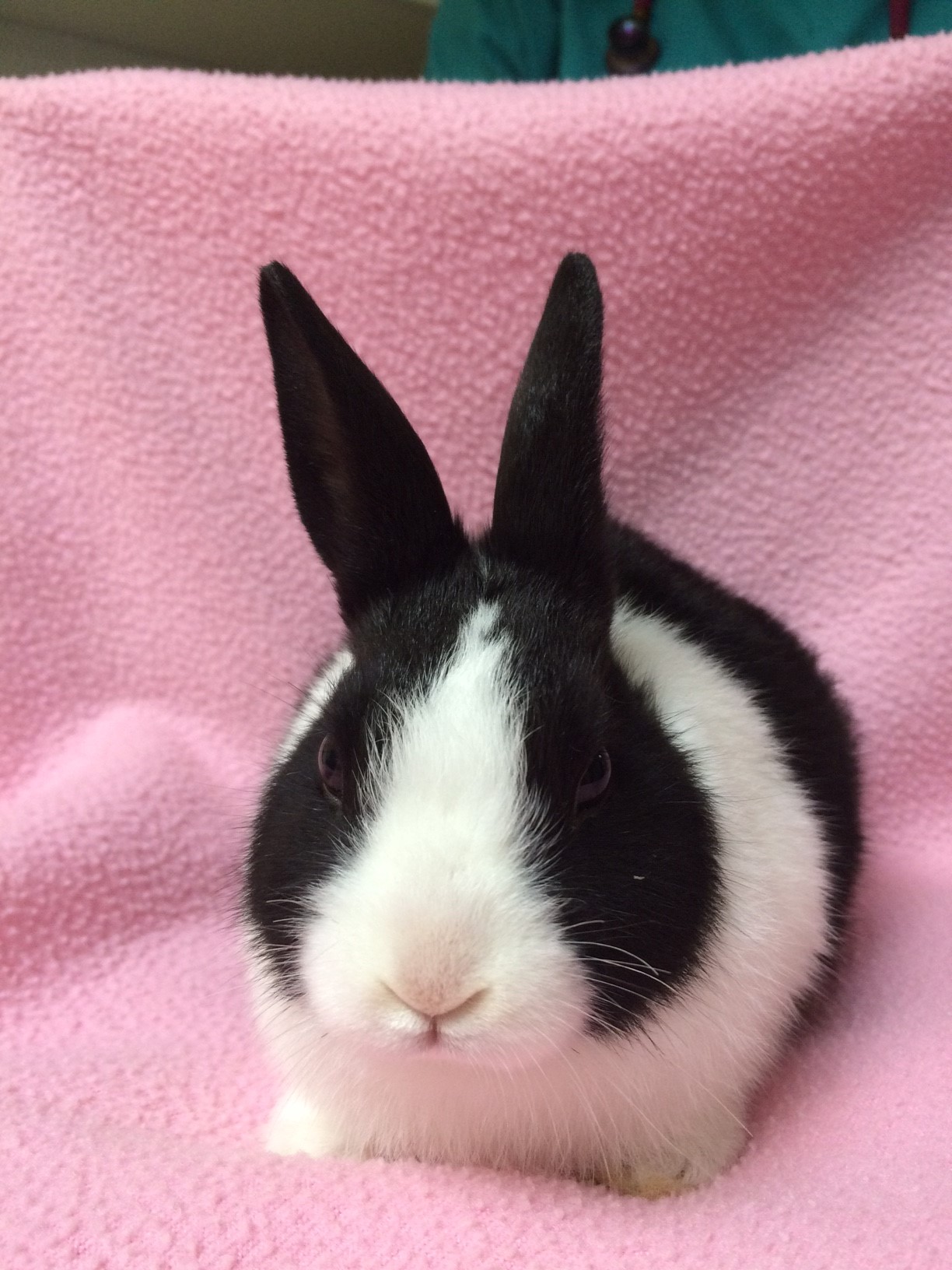
What’s the most popular pet reptile species in the US?
.
.
.
.
.
.
.

What’s the most commonly kept of ALL the exotic species in the US?
.
.
.
.
.
.
.
None of the above! It’s actually the pet fish. Did you know we treat pet fish as well?
Check out the case study of Spike, the betta fish here!
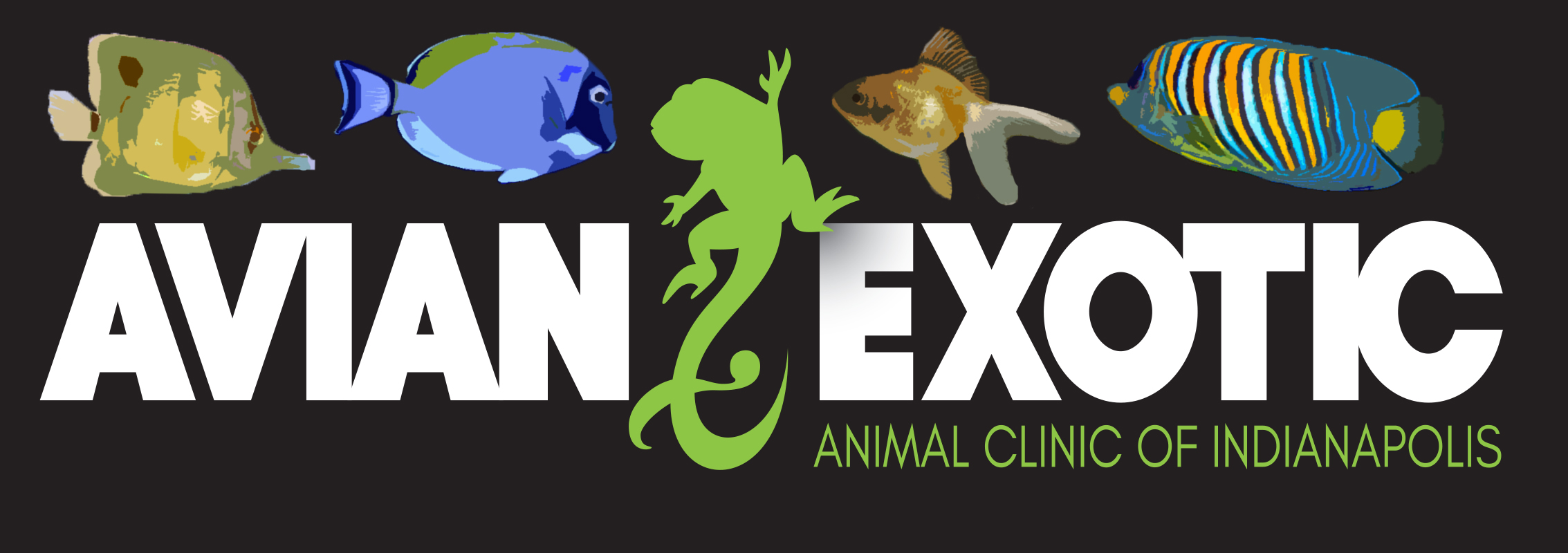
It’s Mid Summer, and the Lightning Bugs are Out!
Do you know which common exotic pet can die from eating just ONE of them? Most exotic pets do not eat bugs. However, a number of our most popular reptile pets consume insects as a regular part of their diet. American bullfrogs have been know to eat lightning bugs, and seem to suffer no harm from doing so. However, the Bearded Dragon, which is not native to the US, appears extremely sensitive to the enzymes that produce the light. Nearly every year we have at least one death in pet bearded dragons that have been fed fireflies, or found them on their own while outdoors.
Lighting bugs and other “bioluminescent” insects have an enzyme called luciferase, which combines with luciferin to produce a chemical reaction and light. It’s not clear exactly what is toxic, and which reptiles can eat them without illness. For this reason, our recommendation is to never feed them to pet lizards. Stick with mealworms, crickets, grasshoppers, most moths and flies. Avoid anything that stings as well.
For more than you ever want to know about fireflies and the chemical reactions that cause bioluminescence, go here: onlinelibrary.wiley.com/doi/10.1002/iub.134/pfd, or look up Luciferase on Wikipedia.
Foraging Balls for Everybody!!!
OK, we thought we were doing great, recommending every rabbit have a foraging ball for their pellets in order to make it a little more difficult to find and eat them, (see our videos on foraging). We use foraging balls designed and marketed for cats for pet rabbits. But did you know there are companies that make foraging balls for nearly every size animal, including horses and even some zoo animals? Take a look at these critters enjoying their foraging balls!
Grand Opening Tour of the Avian and Exotic Animal Inn!
 Come see the Midwest's only boarding facility dedicated exclusively to exotic pets like bird, exotic mammals and reptiles! We will be opening up the Inn for an inaugural Open House on Saturday July 15th from 3-5 PM. Our Inn Keepers will give tours, answer questions, offer refreshments and a chance to win a night of free boarding and other prizes!
Come see the Midwest's only boarding facility dedicated exclusively to exotic pets like bird, exotic mammals and reptiles! We will be opening up the Inn for an inaugural Open House on Saturday July 15th from 3-5 PM. Our Inn Keepers will give tours, answer questions, offer refreshments and a chance to win a night of free boarding and other prizes!
Enrichment is for Everybody!
It's Time Again for the Annual Ferret 500 Show and Exposition!
Traveling with Your Exotic Companion?
 How do you find a good qualified exotic veterinarian when an injury or illness strikes while on the road with your pet? This question comes up from time to time, and we've heard stories of our clients finding great places to care for their pets, and other stories where care couldn't be found, or wasn't ideal.
If you are planning travel, give us a call and we will make recommendations based on where you're going. We know lots of great exotic vets all over the United States and even in a lot of other countries too!
How do you find a good qualified exotic veterinarian when an injury or illness strikes while on the road with your pet? This question comes up from time to time, and we've heard stories of our clients finding great places to care for their pets, and other stories where care couldn't be found, or wasn't ideal.
If you are planning travel, give us a call and we will make recommendations based on where you're going. We know lots of great exotic vets all over the United States and even in a lot of other countries too!
Another great resources is the Vet Finder link on the website of the American Board of Veterinary Practitioners. Choose a location and a specialty (avian, exotic companion mammal or reptile) on the site.
Other options are the "Find a Vet" search tools on the websites of the Association of Avian Veterinarians, the Association of Exotic Mammal Veterinarians, and the Association of Reptile and Amphibian Veterinarians.
Can Cats and Birds Be Friends?
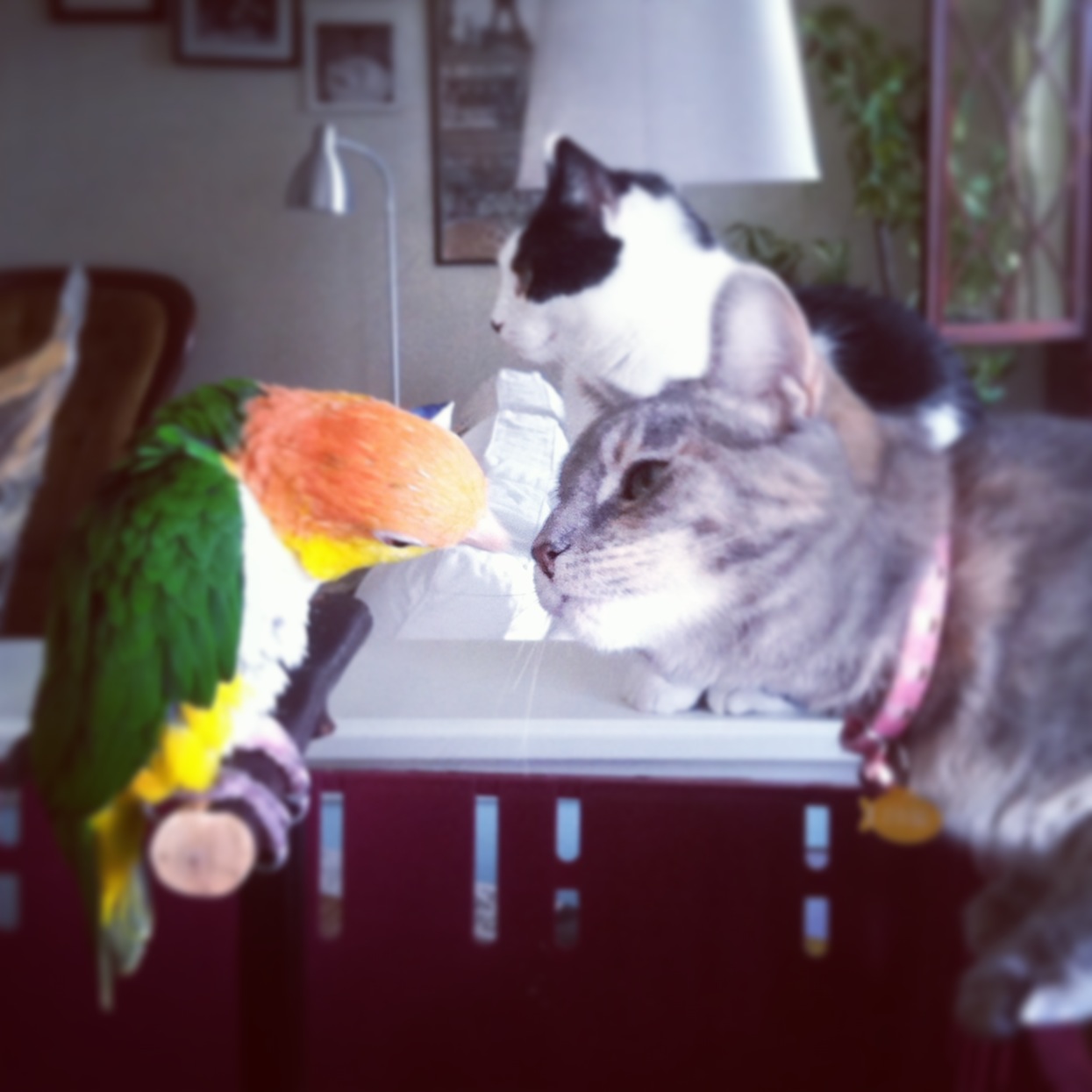 The short answer is no! We have seen a number of videos lately showing cats interacting with birds, usually in a friendly way. In some pictures and videos the bird rides on the cat's back and the two even groom each other. It's always possible prey and predator species can form a bond and exist peacefully together, but we tend to see what happens when contact is a bit more aggressive, even if unintentional. Cats naturally have bacteria in their mouths that they can spread to feet and claws when grooming. These bacteria can be particularly dangerous if they enter the body through breaks in the bird’s skin, or through what even seems to be a tiny bite or scratch.
For this reason, we recommend birds and cats look, but don’t touch! Be aware we know of several cases where cats reached through the bars of cages and grabbed birds inside!
The short answer is no! We have seen a number of videos lately showing cats interacting with birds, usually in a friendly way. In some pictures and videos the bird rides on the cat's back and the two even groom each other. It's always possible prey and predator species can form a bond and exist peacefully together, but we tend to see what happens when contact is a bit more aggressive, even if unintentional. Cats naturally have bacteria in their mouths that they can spread to feet and claws when grooming. These bacteria can be particularly dangerous if they enter the body through breaks in the bird’s skin, or through what even seems to be a tiny bite or scratch.
For this reason, we recommend birds and cats look, but don’t touch! Be aware we know of several cases where cats reached through the bars of cages and grabbed birds inside!
If you suspect your bird has been exposed to a cat bite or scratch, call the clinic right away. Rapid wound care, including antibiotics, are extremely important to prevent a potentially fatal systemic infection that can develop in as little as 24-48 hours.
A Big Thank You to Our Friends at Animal Care Services!
 We would like to take this time to thank a group of hard working individuals who work all year round behind the scenes: our local Marion County Animal Care Services! While we think of Animal Control’s job as handling calls related to stray or mistreated dogs and cats, Control officers are continually bringing us sick or injured wildlife reported by the public, and sometimes even pet exotics that have been turned loose or are being neglected. These guys work really hard to make sure everything possible is done for the critters in their care and definitely don't deserve the bad reputation that comes with the name "Animal Control"!
Wildlife season is upon us, and we expect to see a lot more of our friends very soon.
We would like to take this time to thank a group of hard working individuals who work all year round behind the scenes: our local Marion County Animal Care Services! While we think of Animal Control’s job as handling calls related to stray or mistreated dogs and cats, Control officers are continually bringing us sick or injured wildlife reported by the public, and sometimes even pet exotics that have been turned loose or are being neglected. These guys work really hard to make sure everything possible is done for the critters in their care and definitely don't deserve the bad reputation that comes with the name "Animal Control"!
Wildlife season is upon us, and we expect to see a lot more of our friends very soon.
So a big THANK YOU for all you do!





